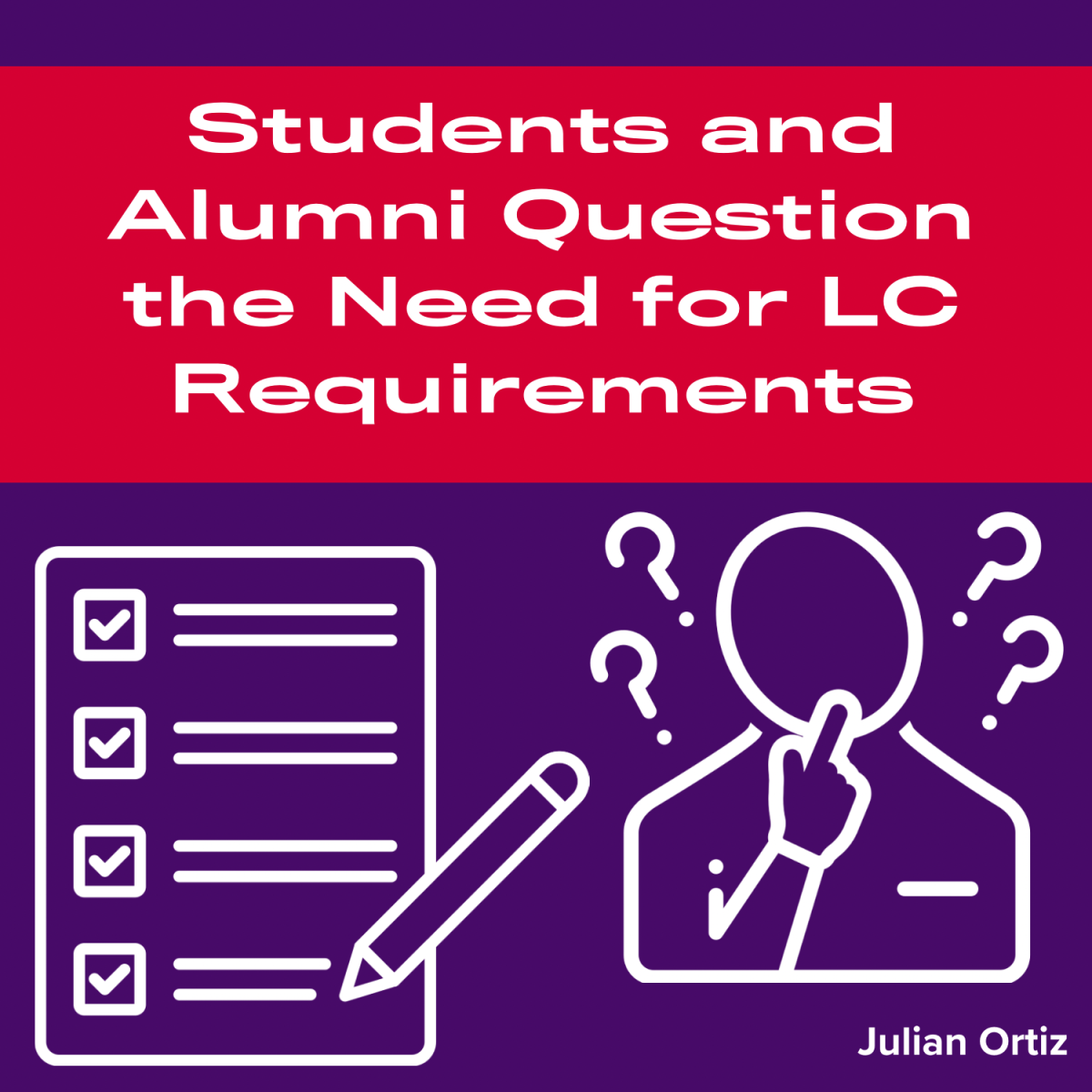One of the main reasons for receiving a liberal arts education is the wealth of topics you are exposed to. Fields or topics a student may not have otherwise sought out are built into the overall curriculum to deliver a well-rounded experience. Linfield University is no different in this regard, requiring students to take 11 different courses from a variety of subjects outside of their major or preferred interests that all serve as the “Linfield Curriculum” (LC). These include broad ideas like “Natural World”, “Vital Past” or “Individuals, Systems and Societies” — all of which have a depth of courses that could fulfill the requirement and check off one of the 11 areas, which is nothing unusual. However, what might be are the LC exemplars.
Students are asked to submit a piece of work from a class in addition to the syllabus to exemplify that they fulfilled the requirement of whichever particular LC they’re submitting for. These exemplars are a required piece for every student to complete to graduate and it’s encouraged that they be submitted shortly after a class’s completion.
According to Andrea Byerley, Senior Associate Registrar, the exemplars are for “Students to thoughtfully consider specific outcomes of their intentionally designed Linfield general education curriculum that can demonstrate the value of the liberal arts education beyond the earned major.”
Gennie VanBeek, Dean of the College of Arts & Sciences, added further context to Byerley’s point.
“Well, generally [LC Exemplars are] the most effective when it occurs right after the learning happens, so ideally, in the system, students would submit their exemplars right after they take a class… upload them and reflect on what they learned and how it meets the objectives,” said Dean Vanbeek.
That said, what’s the need for these exemplars beyond being another piece of paperwork that the general student body needs to complete? How do students feel about them as a tool to consider the learning outcomes Byerley spoke of?
“[LC exemplars] are a decent idea but are currently not enforced in a way that makes them useful. My first year, the exemplars were propped up as these important proofs that would bar students from receiving their degree if they failed to complete them,” said Linfield alum MJ Rinehart.
Fellow Linfield alumnus, Zachary McLeod, Ph.D., expressed a similar viewpoint as well.
“I think they’re a good idea… having some evidence that you have mastered these different topics that you’re supposed to master, but I think the way they do it is lackluster,” said McLeod.
McLeod elaborated on their lackluster nature and value,“It doesn’t show that you really mastered that LC at all.”
Current Linfield sophomore Caroline Smith, a biology major, echoed the sentiments of the alumni.
“I don’t think that having students prove they got something out of a class is unreasonable,” said Smith.
While taking LCs are an often talked about piece of getting a degree here at Linfield, the exemplars are often left by the wayside as a point of importance. Former Editor-in-Chief of the Linfield Review and alumna, Riley Omonaka, talks about her experience concerning the LCs in her waning days at Linfield.
“Out of my whole time at Linfield I thought about exemplars for two days prior to graduation. I always meant to do them after a class was completed, but something always got in the way,” said Omonaka.
Omonaka further explained part of why she had procrastinated submitting the exemplars.
“My classes changed what LC designation they fulfilled right up until graduation, so picking which exemplar to complete for a particular class meant either doing the forms again or taking more classes,” said Omonaka.
Dean Vanbeek agreed that there could be issues with LC designations being a potential barrier to submitting the exemplars.
“You have your 8 LCs and then you think you’re gonna take XY and Z to fulfill them, but oh, Y is this full and I’m on a wait list, so I guess I’ll take Z instead, and now what I’m counting on as my NW will instead become my QR. Yeah, I think that can get confusing. Also, there is no software available that we know of that can automatically make those decisions for a student,” said VanBeek.
While McLeod did not indicate changing LC designations were part of his reasons for not submitting exemplars sooner, he, like Omonaka, didn’t give the LCs much thought prior to graduation.
“I did them all three days before the deadline to do them for graduation. I had forgotten about them because I was told about them during freshman orientation, and then it was never mentioned again until I got the email of ‘you have to do this or else you can’t graduate’,” said McLeod.
Another Linfield alumni, Felicity Fulton shared in Omonaka and McLeod’s sentiments.
“Most people I knew forgot about them because after all the introductory stuff freshman year, nobody really brings up that part of the LC until you get your senior checklist. That caused a mild panic, myself included,” said Fulton.
Dean VanBeek reinforced the notion that students wait until the last minute to submit exemplars.
“The challenge I’ve learned being here since 2008 and having advised tons of students is that many students wait till senior year. Then it becomes something that isn’t as helpful as it could have been right after the class is taken,” said VanBeek.
With Alumni not getting to the exemplars until the final days of their time here at Linfield and the dean herself being aware of the issue, how are current students fairing with the process? Current junior Madeline Chandler, Creative Writing and Theatre Arts double major, shared her experience.
“I haven’t submitted any exemplars yet, largely because I’ve been busy, and the process feels overwhelming,” said Chandler.
Freshman Roan Zigenis, Accounting major and Pi Kappa Alpha member, fell into the same camp as Chandler.
“I have not submitted any because no one has taught me how, I feel that it is an expectation to just figure it out,” said Zigenis.
Whereas Chandler and Zigenis haven’t submitted any to date, Smith has, but may end up following in the alumni’s steps.
“I’ve submitted a few exemplars but not all that I can at this point. The process is tedious and time-consuming and I can’t really do them during weeks that I have a lot of homework already, so I’ll probably end up doing them all at once,” said Smith.
Rinehart had similar thoughts to Smith pertaining to this idea of tedium.
“During my last year, they were just extra paperwork and mildly annoying,” said Rinehart.
Omonaka further contextualizes fellow Wildcats’ feelings over having to submit the exemplars when she was a senior.
“They feel a bit like a chore piled on top of moving, job hunting and all the other tasks associated with moving into the workforce,” said Omonaka.
Even after graduating and reflecting back on her residence at Linfield, Omonaka still isn’t sure why students have to submit the exemplars.
“Is it to check to make sure professors are doing their jobs? Is it to check to make sure students are completing learning objectives? Isn’t that the point of the grades I receive? Either exemplars are pointless, or their objective needs to be more clearly articulated,” said Omonaka.
As for the administrative point of view, Byerley sheds more light on the exemplars importance.
“They provide a robust sample of works for Linfield to assess its success at meeting stated educational objectives, which is an important part of accreditation and self-review,” said Byerley.
Dean Vanbeek offered the most concrete reason as to why the LC exemplars exist.
“Every four years, each LC is evaluated. We look at the learning objectives, and then a committee of faculty that teach in the LC area, look at student work. It’s a way to improve our teaching. Are students meeting goal three of the QR or not, and if they aren’t why?” said Vanbeek.
She added another point of view that perhaps students hadn’t considered.
“It’s also required by the Northwest Commission on Colleges and Universities (NWCCU) because it’s our accrediting body. So any university of quality is accredited and you have to have accreditation for different financial aid and different requirements just to make sure students are really getting what out of the program what they’re supposed to do. They provide our universities accreditation.”
Taken right from the NWCCU’s website, their stated goal is as follows.
“The Northwest Commission on Colleges and Universities accredits institutions of higher education by applying data- and evidence-informed standards and processes to support continuous improvements and promote equitable student achievement and success.”
These ideas are not ones freely shared with the students, who like Omonka, feel left in the dark and unsure about the exemplars’ place within their learning at Linfield. So, what’s the solution then? Both current students and Alumni offered up their ideas on the matter.
“I think it might be better to have the exemplars be a very short paper, one page minimum, that the student uses to write down at least one concept they retained from the class. Of course this idea has its own problems – who’s going to read the submissions – being one of them,” said Rinehart.
Mcleod and Smith took different approaches to this possible solution, but shared a core theme: grades should be example enough that a student has mastered an LC.
“I feel like if you pass a class with an A or B the grade should count as the exemplar because in those cases the student has consistently shown a solid understanding of the course material. In case of passing with a C I think requiring an exemplar to show that the student grasped the main concept of the LC is reasonable,” said Smith.
Chandler operated on the same wavelength as Smith and McLeod, but offered her own twist.
“Students who may have less of a grasp on the material, as evident through a grade like a C- or a D, might benefit from additional evaluation, but I don’t think higher performing students need the same. I think this compromise could also serve as high motivation for students to perform well even in classes that don’t relate to their major, as is the case for many LC’s,” said Chandler.
VanBeek pushed back against the idea of using grades as a form of exemplars.
“From an accreditation standpoint grades are not enough. Right now we’re looking at major outcomes, you know, like in the Journalism and Media Studies (JAMS) major we say you’re gonna learn X, Y and Z. Do you really learn it or not? So majors have capstones. We can’t even use grades for that because of all the other things that are part of grades. Participation, late work or no late work, so from an accreditation standpoint, you have to tie the learning to specific outcomes or objectives,” said VanBeek.
What many students and alumni agree on, regardless of their theoretical solution to doing away with the LC exemplars, is that grades should be sufficient in proving whether or not a student mastered the desired learning outcome. They too expressed that if it were in their power, they would do away with exemplars as they currently are.
What’s next then? None of the parties in the piece expressed a desire to due away with what makes a liberal arts education valuable, only with the administrative piece did they take issue. Going forward it’s clear that the exemplar system ought to be dissolved in its current state or heavily modified to better serve its intended function. As they are, they occupy a negative perception within the student body, past and present and come across as pointless.
Dean VanBeek gave some insight on the future of the exemplars.
“We have assessed the pros and cons of the current system. and we do think there could be ways to be more efficient and effective at doing it, so that it’s not as burdensome, or doesn’t feel as burdensome to students, or like, busy work,” said VanBeek.
There is no clear solution to this issue and any remedy could come equipped with its own set of problems. That said, doing nothing to improve the current system would be more detrimental than seeking change.








